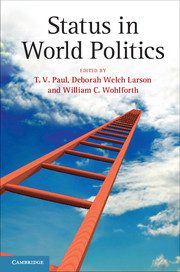Book contents
- Frontmatter
- Contents
- Figures
- Tables
- Contributors
- Acknowledgments
- Part I Introduction
- Part II Admission into the Great-Power Club
- Part III Status Signaling
- Part IV International Institutions and Status
- 7 Status Accommodation through Institutional Means: India’s Rise and the Global Order
- 8 Setting Status in Stone: The Negotiation of International Institutional Privileges
- Part V Status, Authority, and Structure
- Part VI Conclusions
- Index
- References
8 - Setting Status in Stone: The Negotiation of International Institutional Privileges
Published online by Cambridge University Press: 05 June 2014
- Frontmatter
- Contents
- Figures
- Tables
- Contributors
- Acknowledgments
- Part I Introduction
- Part II Admission into the Great-Power Club
- Part III Status Signaling
- Part IV International Institutions and Status
- 7 Status Accommodation through Institutional Means: India’s Rise and the Global Order
- 8 Setting Status in Stone: The Negotiation of International Institutional Privileges
- Part V Status, Authority, and Structure
- Part VI Conclusions
- Index
- References
Summary
This chapter forays into contemporary status competition in world politics from a practice perspective. My key premise is that because status is a social ascription, we should begin with the practical logics that fuel competition instead of starting from deductive categories set up by the analyst. Put differently, the best way to understand status struggles in world politics is to zoom in on how international practitioners conceive of status markers, how they rank countries, and according to what rules of the game. Among other things, an inductive and interpretive approach reveals that practical notions of status evolve over time and space. In fact, more often than not the very nature of status markers, as well as the legitimate ways to pursue them, are eminently contested. In and through practice, then, status competition is not only about how much status one country has, but also about what status is in the first place.
To better understand contemporary status struggles in world politics, this chapter analyzes current debates about reforming the United Nations Security Council (UNSC). These negotiations, which take place mostly at the level of the General Assembly (GA, working group and informal plenary), form a prime locus of status competition in the early twenty-first century. Indeed, nowhere else do states debate as explicitly on the international pecking order and the principles by which a privileged few should be granted special status and powers. To capture status competition in practice, then, the reform debate is a uniquely rich source of data. In the second part of the chapter, I show how the peculiar normative framework of the reform, which in the last twenty years has evolved from a call for more efficiency to a push for more representativeness at the UNSC, significantly constrains the positions that member states take. Thanks to discourse analysis, I reconstruct the intersubjective space of contemporary status competition at the United Nations (UN), which imposes clear limits to how status-seekers may pursue new permanent seats. As self-serving as country positions may be, status competition at the UN is channeled through a practical set of rules of the game that have come to preclude the crude, explicit pursuit of one’s own prestige.
- Type
- Chapter
- Information
- Status in World Politics , pp. 192 - 216Publisher: Cambridge University PressPrint publication year: 2014
References
- 26
- Cited by



